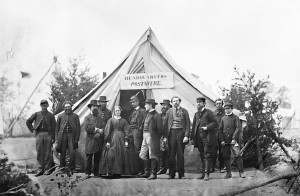By George Sibley
Jobs. I thought that was what the election last year was about – creating jobs, I mean. The party that was more or less in power, the Democrats, had promised jobs but weren’t producing them fast enough, so we the people turned the job of jobs over to the other party whose promises to create jobs had not been tested. Not for two years anyway, not since the eight-year reign of the second Bush, which had seen the creation of very few jobs despite less desperate economic times. But that was then; this is now, and two years is a long a time for Americans to remember an old mistake.
In any case, now we have a new party in power – nationally and in numerous states across the nation. Out of respect for some solid and community-minded Main Street people in Gunnison who still call themselves “Republicans,” I hate to call the party now in power “Republican.” Or “conservative.” But call it what you will – the new party has not yet made job creation a priority. To the contrary, it seems to have hit the ground running with a “deficit reduction” agenda that makes job elimination a priority. Virtually everything the House of Representatives has proposed eliminates jobs. All told, their budget cuts do not add up to what could be saved by cutting one or two of the Pentagon weapons development projects that are known to be outmoded. A recent analysis story in the New York Times tallied up $1.3 trillion in possible savings over the next decade by eliminating Pentagon boondoggles (my word, the article was more polite).
But it seems obvious that deficit reduction is just an excuse, not a goal, for the new party in power. They are in fact out to eliminate certain kinds of jobs. Planned Parenthood, the Corporation for Public Broadcasting, the EPA, Americorps, and other national and community service programs. If it is a social program that grew out of a desire to improve the quality of life or to help people in trouble, they are trying to eliminate it.
Their fellows at the state level are eliminating jobs even faster – and trying to eliminate the unions that (perhaps overzealously sometimes) try to protect jobs. Teachers are being threatened with thousands of lay-offs across the nation – something like 15,000 have already been let go. In some states, notably Wisconsin, the jobcutters and unionbusters have even abandoned the excuse of deficit reduction. The new party in power in Wisconsin had to actually create a deficit – easy enough, corporate tax reductions – in order to have a deficit to use as an excuse. Then when the Wisconsin Democrats decamped to Illinois in order to prevent the quorum necessary for fiscal measures, the new party in power just removed the deficit-reduction aspects of their union-busting bill and went ahead and passed it. Thereby making Wisconsin safe from – teachers, janitors, and state bean counters?
It is possible that by the time you read this, the new party in power will actually be starting to begin to commence to proceed on plans to create jobs – to replace some of the jobs they’ve eliminated. It is possible. But what I wonder is what they will do. My guess is more incentives to the private sector like tax breaks for companies that create new jobs. I’ve got no problem with that, but there are legitimate reasons to wonder how much such measures are going to help. Among other things, it would require banks to willingly open up more credit, which they’ve been reluctant to do. And it would require expanding markets – customers – for whatever products or services were created, a prospect that remains ambiguous at best.
It would also require those new-job businesses to resist the temptation to cut costs and boost profits by leaving the country in pursuit of cheaper labor. What would keep them home, of course, would be cheaper labor here, and there is a constant pressure on organized workers to accept lower wages. It isn’t necessary to put pressure on unorganized workers; their wages are just cut and they either accept it or walk. Robert Reich – Secretary of Labor under Clinton, now a columnist/blogger – recently wrote an analysis piece concluding that “the only way many of today’s jobless are likely to retain their jobs or get new ones is by settling for much lower wages and benefits.”
Another question, though, is – will the private sector generate products or services that people actually need? In the interest of full disclosure, I should say that I am a lousy shopper; beyond food and drink, fuel for the car and house, and basics like that, I don’t buy much stuff. But I use streets and highways quite a lot, appreciate the opportunity to flush a toilet rather than deal myself with what’s there, turn on faucets expecting water, use the interlibrary loan program when I need a book, go to the National Forest when I want to hike or ski, appreciate that we have cops to take care of stuff I’m glad I don’t have to take care of – et cetera.
In short, most of what I need for a good life in the Upper Gunnison comes out of the public sector – and I am glad to pay taxes for it all. I resent the amount of my federal tax dollar that is wasted in foreign wars and drug wars that go nowhere. But, I would be plenty willing to pay a higher gasoline tax if it were going toward the development of alternatives that might be available by the time gasoline gets up in the $10-15 a gallon range.
We have this mystical faith in America that, if we unleash human ingenuity in a relatively unconstrained economic environment, a vital and vibrant economy will emerge. Idea capital will find and marry money capital, and human capital will be put to work realizing the ideas, all as if “guided by an invisible hand.” And that does happen; we saw it most recently in the development of the “personal computer.”
But we should also remember the phenomenon that most realized the potential of the personal computer, the Internet, which began as a government program, and its incredible growth has occurred against a background fight to keep control of it from falling into the hands of private companies who would start limiting access in profitable ways.
It’s also possible that computers will ultimately eliminate as many private sector jobs as they have created, as industries “employ” more and more robots. The computer and Internet also make it easier to outsource work.
In short, I am not impressed by the current conviction – shared by both major parties – that it’s time to build up the private sector and, as much as possible, eliminate our governments. We are in a hole that was dug for us by an unregulated private sector that behaved with utter irresponsibility. Even if there were any signs of remorse for that irresponsibility – which there isn’t – I would still be dubious of their ability to lift us out of the hole – especially by providing us with the “products and services” we really need, rather than just another bunch of stuff to buy.
The best option, it seems to me, is to work for a conscious balance of “private and public capitalism.” There’s nothing that says “capitalism” has to be a private sector thing. It is just a word for the process of bringing together financial capital, idea capital, human capital and usually some “natural capital” (whatever natural resources need to be consumed).
We actually had some good examples of that balance in the New Deal – which has now been deprecated as the origin of American deficit spending and therefore an evil thing. But most of the money the government borrowed in the 1930s was not given away; it was reloaned – and eventually paid back to the government. The Public Works Administration loaned money to towns, cities, utilities, counties, states, to build the water systems, sewer systems, school gymnasiums, bridges, roads and other infrastructure they needed but could not afford through private bonding – and those projects put local contractors, builders, and plain workingmen back to work. There were also grants thrown in sometimes to boost the employment. But for the most part PWA projects were straightforward low-interest, long-term loans that the beneficiaries had to pay back. And for the most part, did.
The Rural Electrification Administration (REA) program was another good “private and public capitalism” example. Left to the private sector, there might still be no electricity outside the towns and cities in the West; it wasn’t profitable enough for private utilities. So the REA created another loan program – loaning both long-term low-interest money and upfront technical expertise for setting up electric systems. That did not create so many jobs directly as the PWA did, but it provided the infrastructure for marketing a lot of farm equipment and home appliances. And the loans were paid back.
The private sector is constrained by what is profitable; the public sector doesn’t need to generate a profit. Which is more likely to create jobs for doing what really needs done? Which is less likely to “offshore” the work to China? And which is the new party in power least likely to support?
George Sibley mines for metaphors in the Upper Gunnison Valley.


